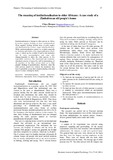Please use this identifier to cite or link to this item:
https://cris.library.msu.ac.zw//handle/11408/1259| Title: | The meaning of institutionalisation to older Africans: a case study of a Zimbabwean old people’s home | Authors: | Hungwe, Chipo | Keywords: | Institutionalisation; Death; Bitterness; Restriction; Immortality; Food; Companionship; Home |
Issue Date: | 2011 | Publisher: | Electronic Journal of Applied Psychology | Series/Report no.: | Electronic Journal of Applied Psychology;Vol. 7, No. 1; p. 37-42 | Abstract: | Institutionalisation is foreign to older persons in Africa. It invokes negative feelings on those institutionalised. These negative feelings include those of guilt, neglect and abandonment by relatives, regret and powerlessness. While institutionalisation cannot be avoided especially for destitute individuals, it has depersonification effects, some of which can be avoided if staff at the institution can be more accommodative and some rules changed/repealed to allow the older persons to live respectable existences. The intentional and sometimes calculated exercise of power by staff in determining all the activities of the older persons feeds on to older people‟s feelings of powerlessness. However, since the older persons cannot live without the institution they have to gratefully accept their situation dealing with each day as it comes, waiting for death. | URI: | http://sensoria.swinburne.edu.au/index.php/sensoria/article/view/219/240 |
| Appears in Collections: | Research Papers |
Files in This Item:
| File | Description | Size | Format | |
|---|---|---|---|---|
| 219-884-1-PB.pdf | 244.31 kB | Adobe PDF |  View/Open |
Page view(s)
200
checked on Feb 21, 2026
Download(s)
46
checked on Feb 21, 2026
Google ScholarTM
Check
Items in MSUIR are protected by copyright, with all rights reserved, unless otherwise indicated.



